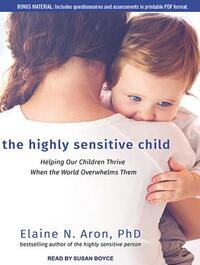Take a photo of a barcode or cover
101 reviews for:
The Highly Sensitive Child: Helping Our Children Thrive When the World Overwhelms Them
Elaine N. Aron
101 reviews for:
The Highly Sensitive Child: Helping Our Children Thrive When the World Overwhelms Them
Elaine N. Aron
informative
medium-paced
I found this book really helpful in terms of understanding some of my oldest child's more unique qualities. I realize now that I am also highly sensitive, but there are ways in which it affects him that I hadn't previously understood. What looks like anxiety is probably more like being overwhelmed or overstimulated by particular circumstances (and am coming to realize this is probably also true for myself). The result can sometimes be bratty behavior. I knew instinctively that it was not simply a problem of attitude, as he is generally a very pleasant and well-behaved kid. I now have a better understanding (via this book and his therapist) of what is going on when the monster comes out.
A lot of her suggestions are things that I have implemented intuitively due to understanding his needs (in large part because we are so alike), and that was encouraging. I mean, who doesn't love a book that tells you you're doing things right??
I think I have a better understanding now of when it it safe to be firm and corrective, and when I need to prioritize his need for calm & safety FIRST and focus on negative behaviors later.
I think in some respects, her advice leans a bit on the coddling side. But I also think that these are kids who are a bit more needy. Finding the balance seems to be the great challenge with these kids.
If you have a kid who leans "highly sensitive" - this is probably worth a read.
A lot of her suggestions are things that I have implemented intuitively due to understanding his needs (in large part because we are so alike), and that was encouraging. I mean, who doesn't love a book that tells you you're doing things right??
I think I have a better understanding now of when it it safe to be firm and corrective, and when I need to prioritize his need for calm & safety FIRST and focus on negative behaviors later.
I think in some respects, her advice leans a bit on the coddling side. But I also think that these are kids who are a bit more needy. Finding the balance seems to be the great challenge with these kids.
If you have a kid who leans "highly sensitive" - this is probably worth a read.
informative
slow-paced
15-20% of children are Highly Sensitive (HSC). If you are finding that your child isn't exactly "normal", much of the helpful parenting advice of others doesn't work for your child, and he/she often complains about some sort of sensory input (say loud noise, or tastes or smells) beyond what seems like a reasonable amount of complaining, you may have an HSC. This book contains a questionnaire that will allow you to determine if your child is highly sensitive. It also is full of helpful information in determining strategies to parent HSCs. It is well researched, well written, and full of examples. You owe it to your potentially highly sensitive child to do a little research before you allow "the man" to put them on ADHD drugs, which do help many children but are widely over-prescribed. This book is a great place to start in learning about HSCs.
informative
slow-paced
I wish I had known about The Highly Sensitive personality trait when my oldest was a toddler. It would have saved all of us so much angst, confusion, and misunderstanding. With just a few guidelines I have learned from this book, many of his group activities would have been drastically changed and improved for everyone involved. It has helped me realize my youngest is an HSC as well. I also identified with so much in this book, making me realize I am an HSP and am looking forward to reading Ms. Aron’s other books on this subject. Toward the end I felt like the book dragged, but I believe she reiterated so much throughout so the book is more a reference book as opposed to a cover to cover book. I will be thankful I own a copy to refer to again and again.
Brilliant advice for all parents who have been gifted with an HSC. If you would like your child to become a strong and self aware adult, rather than broken and searching fornan identity, this book is a wonderful guide.
This is a very detailed, thorough primer on understanding and responding to high sensitivity in children.
There's a lot of good in this book. It's chock full of helpful information and examples. I think the premise of the book and the advice to parents is important and well-written. I did have a few issues that I think would be solved if Aron updated the book as it's almost 20 years old! We could use some research updates and greater clarification of overlap and differences between high sensitivity and developmental disorders. Aron presents some antiquated views of ADHD and autism spectrum disorder that implied (especially for ADHD) that you cannot be highly sensitive and have these disorders. I would love a more nuanced exploration of supporting kids with high sensitivity and developmental or mental disorders. Like does her advice change if the child is not only sensitive to crowds but also socially anxious? I also would've appreciated some more succinct takeaways for parents. There is so much detail in this book, and Aron does a good job highlighting the need for flexibility (i.e., there are no hard and fast rules as what will be beneficial depends on the unique child), but as a result, it's a little overwhelming.
4/5
There's a lot of good in this book. It's chock full of helpful information and examples. I think the premise of the book and the advice to parents is important and well-written. I did have a few issues that I think would be solved if Aron updated the book as it's almost 20 years old! We could use some research updates and greater clarification of overlap and differences between high sensitivity and developmental disorders. Aron presents some antiquated views of ADHD and autism spectrum disorder that implied (especially for ADHD) that you cannot be highly sensitive and have these disorders. I would love a more nuanced exploration of supporting kids with high sensitivity and developmental or mental disorders. Like does her advice change if the child is not only sensitive to crowds but also socially anxious? I also would've appreciated some more succinct takeaways for parents. There is so much detail in this book, and Aron does a good job highlighting the need for flexibility (i.e., there are no hard and fast rules as what will be beneficial depends on the unique child), but as a result, it's a little overwhelming.
4/5
informative
Much of the strategies in this book are simply good parenting. I did find some of the information and examples helpful in understanding my own child. It also clued me in on where we might be unintentionally overwhelming her. However, I did not care for the authors writing style. In her efforts to make the HSP group special, she often came across as condescending to those who just don’t “get it”. The tips for teachers that was recommended parents give to teachers was pompous and presumptive rather than collaborative. I’m glad I read it, but am equal parts enlightened and annoyed.
Informative. It would seem my son classified as highly sensitive in many ways. I always assumed he had features of add but now I’m convinced he’s more highly sensitive. This book has made me more understanding of his temperament and more patient when addressing some of his issues. At times, I did feel like any child could fit into the mold created in this book but overall it didn’t matter because it just build more understanding and patience anyway.


